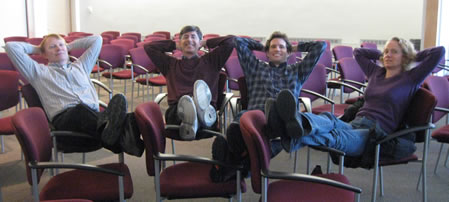Despite modest economic gains, gloomy unemployment numbers and low workplace morale still loom large within corporate America. Whether or not companies can capitalize on the momentum of this fragile financial revitalization is dependent on more than enhancing consumer confidence or introducing new products to the marketplace—it falls largely on employees working for organizations and their level of commitment to corporate success. Researchers from the Kellogg School of Management at Northwestern University and the Haas School of Business at the University of California, Berkeley have discovered that building a more committed workforce can be as simple as asking employees to reflect on their company’s history. [continue reading…]
Workplace

L-R: Lazy Bureaucrat Researchers "Kicking Back"; Joseph Mitchell, Steven Skiena, Michael Bender, Esther Arkin
How do you develop schedules for workers whose goal is to complete the least amount of work possible?
It’s an age-old problem and the question behind a study by four Stony Brook University professors, which was cited in a recent article of the United Kingdom newspaper The Guardian.
The study by Esther Arkin and Joseph Mitchell of the Department of Applied Mathematics and Statistics and Michael Bender and Steven Skiena of the Computer Science Department was published in 2003 in the journal Information and Computation. The team characterized their study of “The Lazy Bureaucrat Scheduling Problem” as: [continue reading…]
Psychologists will share the success of their ground-breaking back-to-work programme for the long term unemployed, Skills4Success, today, 13th January 2010, at the British Psychological Society’s Division of Occupational Psychology Annual Conference in Brighton
Chartered Psychologist Nancy Doyle will present the results and techniques used in the Skills4Success programme, which uses the latest psychological techniques to help its unemployed participants take control of their careers and acquire gainful employment.. [continue reading…]
Although women have made strides in the business world, they still occupy less than two percent of CEO leadership positions in the Fortune 500. Not surprisingly therefore leaders still tend to be thought of as men and most industries are considered to be male-typed at management levels. However, as more women move into management positions within a handful of industries, these industries are becoming more gender-neutral and stereotypes of leaders as men may be changing. A study published in an upcoming issue of the Psychology of Women Quarterly examines these issues, investigating how men and women leaders and their teams are evaluated differently depending on the gender-typing of the industry in which they work. [continue reading…]
